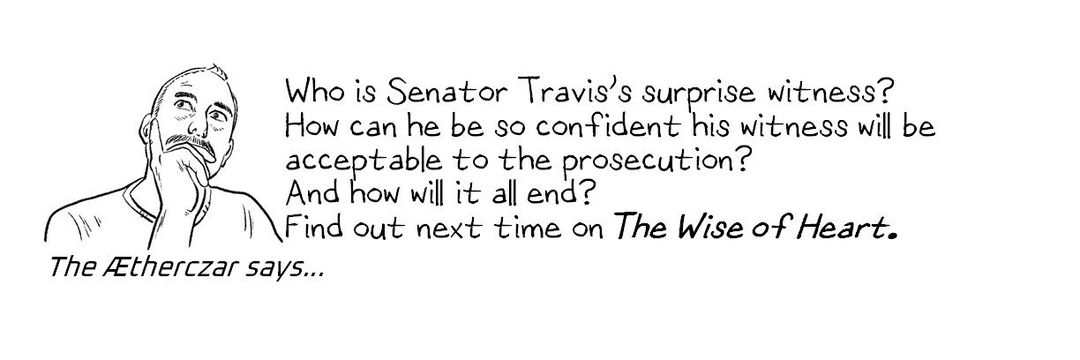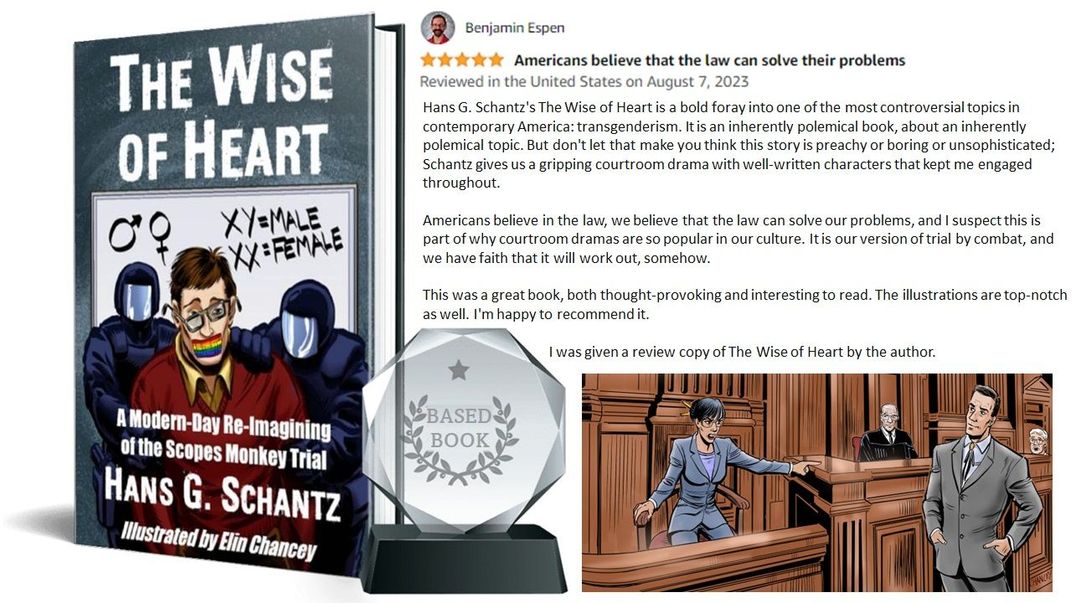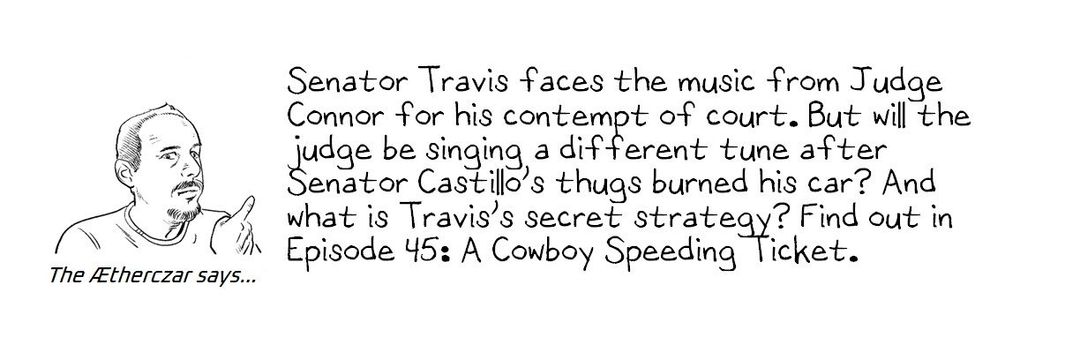
Episode 45 A Cowboy Speeding Ticket
“Mike!” The senator shook his client’s hand in greeting as Deputy Martínez brought him to the defense table.
“How’d the meeting with the judge go?” Mike asked.
“Fine, fine,” Senator Travis assured him quietly. “Let’s not talk about that, though. People might ask questions. There’s something we need to discuss, however.”
The senator looked to either side to confirm they weren’t being overheard and spoke softly.
“The press is saying Castillo plans on making a big announcement in her closing statement,” the senator explained.
“Acey told me that Castillo plans to declare her candidacy for president in her closing statement,” Kim leaned over the rail to confirm.
Senator Travis grinned. “I think we have an opportunity to administer what we call a ‘cowboy speeding ticket’ here.”
“What’s that?” Mike asked.
“Why,” Senator Travis smiled, “that’s when we lasso and hogtie her by…”
“Hear ye! Hear ye! All rise,” Deputy Martínez interrupted what Senator Travis was trying to tell Mike. All stood within the courtroom. “The Fifth District Court in and for our great Commonwealth, the Honorable Jordan Connor presiding. God save this state and this honorable court. The case of the State versus Michael Philip Andrews. All those with business before this court draw near; you will be heard.”
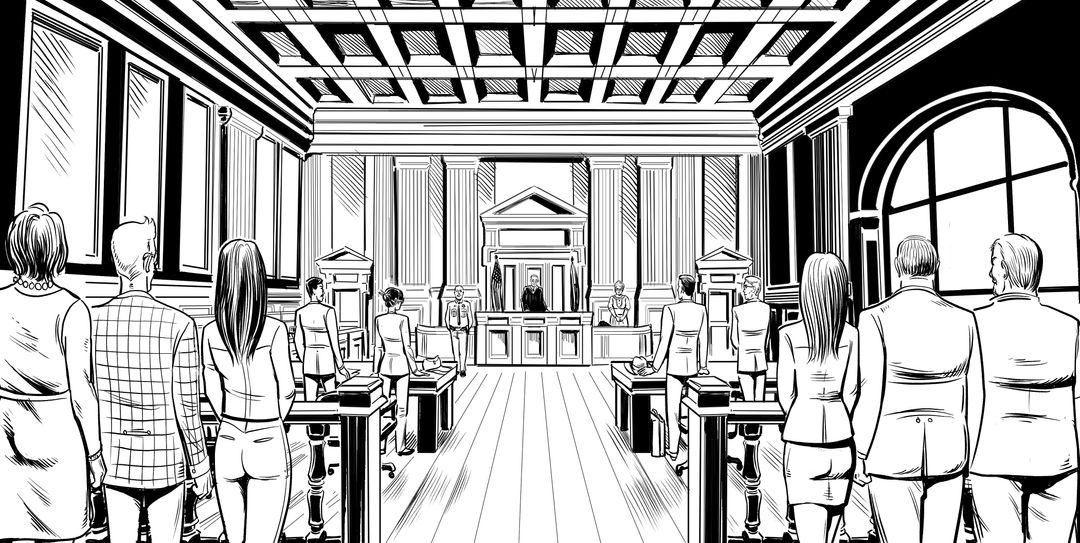
The judge walked into the courtroom and took his seat behind the bench.
“Your honor,” Senator Travis remained standing, “I would like to address the bench regarding my conduct and statements of yesterday.”
“Alright, Professor Travis,” Judge Connor nodded, “I will hear you.”
“Thank you, your honor,” Senator Travis picked up his legal pad and began. “Now, I have been practicing law for decades when I haven’t been serving the Lone Star State in public office, and I had any number of cases where I have had to do what I have been doing here: fighting public opinion in the community where I was trying the case, even in my own home town, and I never yet have in all my time had any criticism by the court for anything I have done or said in court. That is, I have tried to treat the court not only fairly but also a little more than fairly, because when I recognize the odds are against me, I try to lean the other way the best I can. I don’t think any such occasion ever arose before in my practice.
“I am not saying this, your honor, to influence you, but to put myself right. I do think, however, your honor, that I went further than I should have gone, yesterday. I assure the court my actions were not premeditated or intended to insult your honor.
“To be clear, I came here a perfect stranger, and I can say what I have said before: that I have not found upon anybody’s part here in this town the slightest discourtesy. I have been treated as hospitably as would have been the case in Texas… well, at least until last night when what appear to be outside agitators tried to burn down your courthouse with me inside it. Now, I certainly mean nothing against the people of your great state, whom I don’t think are in any way involved.
“But the events of last night highlight the importance of calming the passions and rejecting the ill-tempered and inconsiderate words that may in due time escalate to violence.
“As your honor knows, these things come up in court time and time again, and it is not unusual perhaps in a case where there are strong feelings that some lawyers will overstep the bounds. I am quite certain that I overstepped yesterday.
“Personally, I don’t think my comments constitute contempt, nor do I feel contemptuous toward this court, but I am quite certain that I should not have made my remark, and the court could not help taking notice of it.
“I am sorry that I said it, and I want to apologize to the court for it. While I disagreed with your ruling, I should not have shown the court any disrespect. I am sorry, and it won’t happen again.”
Senator Travis laid down his legal pad and remained facing the bench to accept judgement.”
The judge fixed him in his gaze. “If this little incident had been personal between Professor Travis and myself,” he replied, “it would have been passed by as unnoticed. When a judge speaks from the bench, however, or acts from the bench, his actions are not personal, but are on behalf of the great state where he lives. I could not afford to pass those words by without notice, because to do so would not do justice to the great state for which I speak. I am proud of our state, so I feel that we must preserve its good name.
“I accept Professor Travis’s apology. I am sure his remarks were not premeditated. I am sure that if he had had time to have thought and deliberated, he would not have spoken those words. He crossed the line just at a moment when he felt great disappointment that the court had ruled against him. Taking that view of it; I feel that I am justified in speaking for the people of this state when I say to him that we forgive him, and we forget the matter.”
“Thank you, your honor,” Senator Travis replied.
“Before we begin, I do have another concern, your honor,” Senator Travis continued. “The jurors entering the courthouse this morning were confronted by a panoply of gay pride and transsexual banners and flags, creating the impression that this impartial institution endorses the political ideologies for which they stand.
“I respectfully request they be removed.”
“If your honor please,” Senator Castillo rose, “why should they be removed? Those banners and flags stand for justice and equality; they stand for the inclusion of all peoples, no matter their race or sexual orientation. To remove those symbols would suggest that this court rejects those universally recognized principles.”
“To the contrary, your honor,” Senator Travis countered, “it is the American flag that represents our nation, our fundamental civic principles, and stands as a symbol for all of us who are sheltered and protected underneath it, regardless of our race, our religion, or our sexual orientation. The gay and transsexual rainbow banners and other emblems represent a divisive political element offensive to Christians and other Americans who regard pride as a sin, and who oppose flagrant displays of homosexuality and transsexuality as attempts to desensitize their children to sexual content, and to groom their children for sexual exploitation.”
“Order,” Judge Connor banged his gavel to silence the angry murmurs from the audience.
“Your honor,” Senator Travis continued, “partisan banners proclaiming the court’s affiliation and alignment with the ideology of the political party now in control of the mechanics of the state government are no more appropriate than would be signs admonishing one and all to, say, ‘Read Your Bible,’ or even patriotic slogans co-opted by a particular political party such as a banner advocating us to ‘Make America Great Again.’”
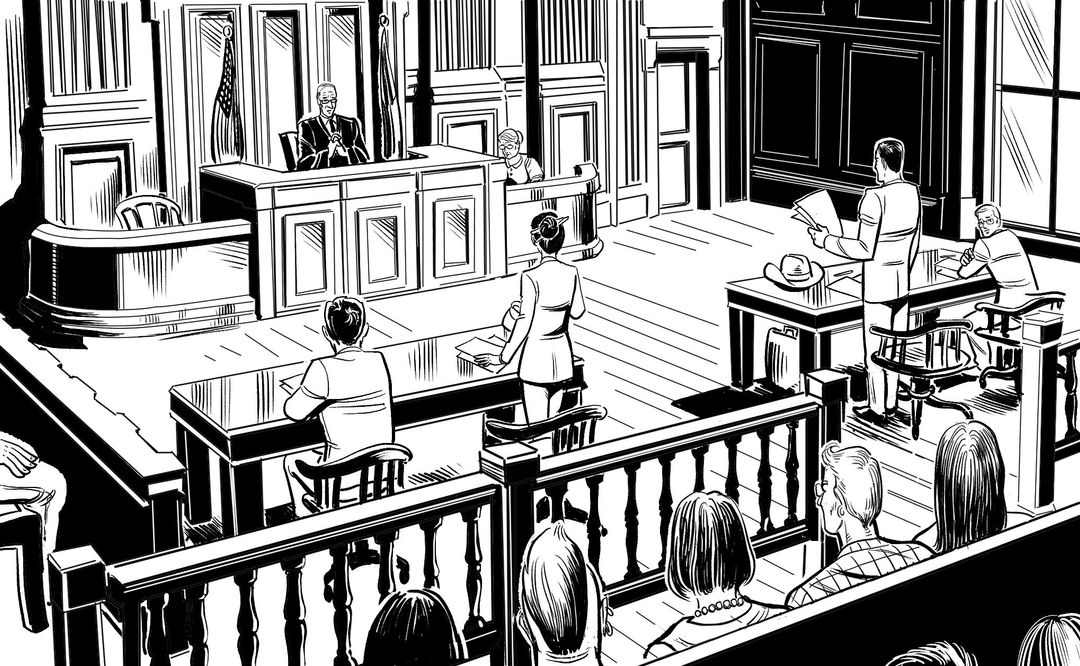
“Your honor,” Senator Castillo interjected, the sarcasm obvious in her voice, “if the counsel for the defense is intolerant of public displays of the importance of inclusion and respect for all peoples, if counsel for the defense sees only his narrow-minded religious beliefs as relevant and is triggered by outward signs of equality and justice, then perhaps the court SHOULD order the removal requested by the defense.”
A round of applause prompted a sharp rebuke from the judge. “Order!” He banged his gavel. “Order in the court!”
“Your honor,” Senator Travis held his hands wide in supplication. “The religious belief or non-belief of the respective counsels are not on trial here. Proponents of the transgender ideology have the First Amendment right under our Constitution to express themselves with their rainbow banners on their private property as they wish, just as the religious have their right to display their crosses or other emblems and icons of their own ideology. The government in general and this court in particular should remain impartial on such matters.
“The defense merely asks the court to remove anything of a prejudicial nature, so that we may try these issues in a nonprejudicial manner. May I remind opposing counsel and the court that exposure of the jury to possibly prejudicial material, or a trial held in an atmosphere of mob or threatened mob domination is undeniably a violation of due process and grounds for an appeal. Furthermore,” Senator Travis narrowed his eyes and fixed Senator Castillo in his gaze, “18 U.S. Code § 1507 specifically prohibits demonstrating near a courthouse with the intent of influencing the court.”
His honor looked intently over his glasses at Senator Travis and Senator Castillo for a long moment, as if daring them to argue further.
“The issue in this case is whether or not Dr. Andrews unlawfully taught that gender identity has a biological meaning independent of any person’s chosen preference,” the judge explained. “While this court upholds principles like justice and equality, it is for the jury to decide how those principles are to be applied in this case. If the presence of rainbow flags and banners irritates anyone, or if they think it might prejudice the jury, my aim is to ensure both sides a fair trial. Therefore, I WILL order the flags and banners removed.”
“Order,” Judge Connor banged his gavel to silence the mixture of applause and sounds of discontent from the audience. The judge pointed his gavel at the Deputy Martínez. “Bailiff, please instruct the custodial staff to remove any and all flags and banners from the courthouse except for the U.S. and state flags.”
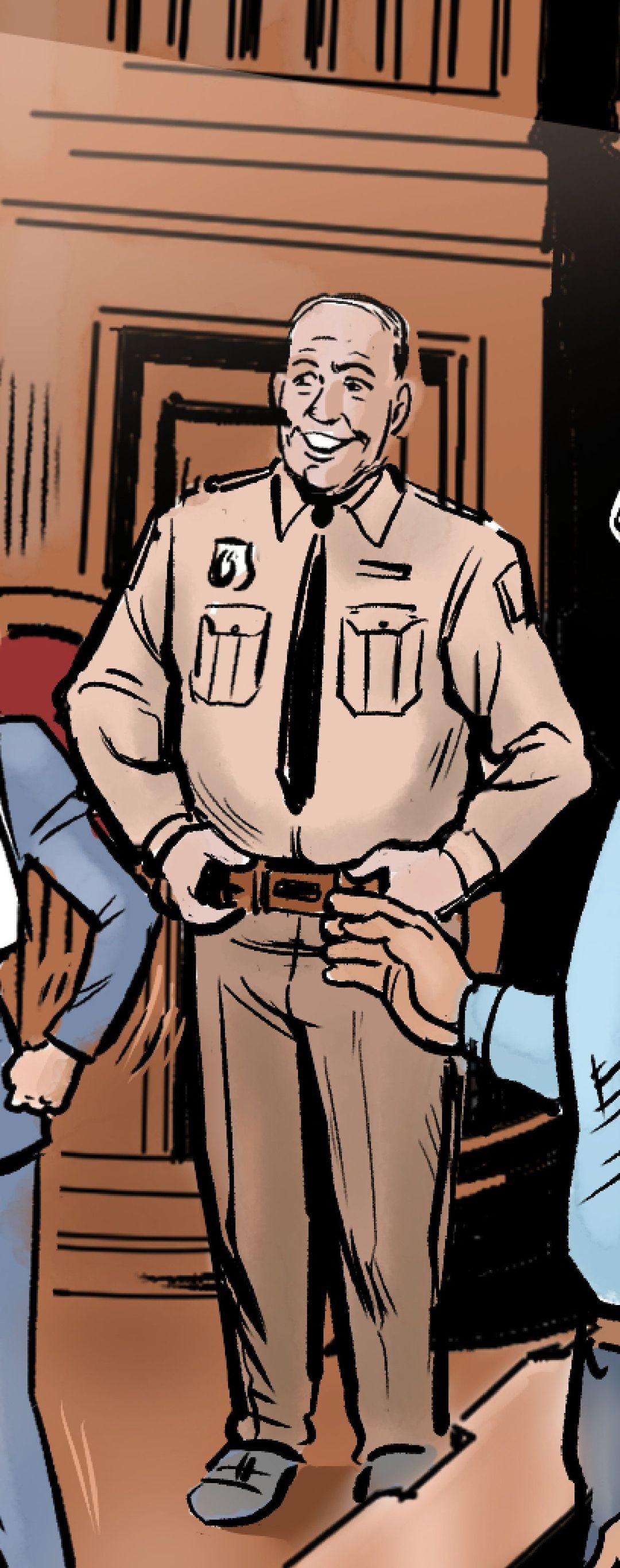
“Yes, your honor,” Deputy Martínez replied with a hint of a smile, and he stepped out of the courtroom.
“Thank you, your honor,” Senator Travis nodded, acknowledging the ruling and took his seat.
“Now then, has the defense concluded,” Judge Connor asked, “and may we proceed to the closing statements?”
“Your honor has placed the defense in a difficult position,” Senator Travis popped back up. “Our defense relies upon expert testimony as to the nature of gender identity – expert testimony that your honor has chosen to exclude. If it please the court,” Senator Travis placed his legal pad on the defense table and approached the bench arms spread wide in supplication, “if the defense were able to summon an expert witness on social justice and gender studies, an expert that even the prosecution,” he gestured over toward Senator Castillo, “agreed was qualified to answer questions and provide expert testimony on the subject, would the court be willing to allow the defense to present that testimony?”
The judge raised an eyebrow and looked over at Senator Castillo. “I suppose if the state had no objection to your expert witness, and if that witness were to testify specifically as to the nature of gender affirmation as described in the GAIA Act, I would be willing to allow you to present that expert testimony to the jury.”
“Thank you, your honor,” Senator Travis walked back to the defense table and picked up his legal pad. “The defense wishes to call an expert witness we are confident the state will agree is qualified to testify ‘as to the nature of gender affirmation as described in the GAIA Act,’” he quoted the words of the judge’s ruling back to him.
Then, Senator Travis approached the bench again. “We do have such a witness present in the courtroom with us, a witness qualified and prepared to answer the defense’s question about biology and gender affirmation.”
